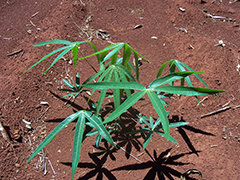 Cassava plant. Picture by Loco085 via Wikimedia Commons
Cassava plant. Picture by Loco085 via Wikimedia Commons
Researchers from the RIKEN Center for Sustainable Resource Sciencehave discovered over 10,000 DNA polymorphisms in cassava (also known as manioc, mandioca or tapioca) a tropical crop that serves as the primary food source for millions of people worldwide.
Cassava is an important crop that provides food security and income generation in many tropical countries, and is known for its adaptability to various environmental conditions.
By scanning the entire draft genome sequence of cassava, as well as cDNA sequences from the GenBank public databank, the researchers discovered 10,546 single-nucleotide polymorphisms (SNPs) and 647 insertions and deletions. Their research also indicates a relationship between SNPs and stress responsive or disease-resistance genes.
To facilitate the development of molecular markers for cassava, the team designed 9,316 PCR primer pairs to amplify the genomic region around each DNA polymorphism, and placed the information in a freely available web-based database.
These findings will contribute to the effective breeding of new strains of cassava with useful traits such as high yield and high tolerance against environmental stress.
The study is published in the journal PLOS ONE, doi: 10.1371/journal.pone.0074056.
